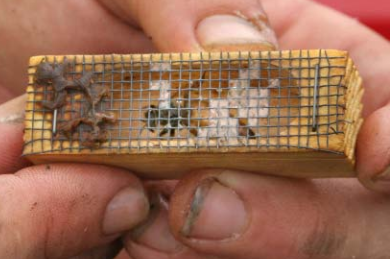
By Ted Salois, Helix Water District
October 11, 2016 (San Diego's East County) - Jesse Adcock knows bees. He moves among them with the ease and acceptance of a good friend—because he is one, even though the bees don’t know it.
His “self-taught” expertise with the busy, buzzing, honey-makers tells him how to approach a sizable nest while remaining safe. His choice of clothing--t-shirt, shorts and sandals--shows confidence in his judgment. “When I first arrive at a hive, I listen to the sound the colony is making,” Adcock said. “I can tell by the tone whether they’re angry or likely to become aggressive.”
If he senses a potential for trouble, he said he can quickly slip into his traditional beekeeper’s suit for protection.
Adcock’s company, J R Bees, LLC, collects the insects and puts plenty of miles between them and human dwellings. Such relocation efforts preserve the hives so their colonies can survive and thrive, pollinating and propagating to benefit the environment.
Helix Water District engages Adcock’s services on an as-needed basis. Bees like to build their work stations in the dark, secluded, relative safety of in-ground concrete boxes that house residential water meters.
Removal operations begin with some dry brush burning inside a snooted tin can.
“I get smoke blowing into the hive, setting the bees into a frenzy of gorging,” Adcock said. “They think there’s a fire. nearby. So, instinctively, they take as much honey and food and everything they can with them, expecting to re-establish a hive in another location.”
Their gluttony provides a protective shield for Adcock as he performs his tasks. Bellies round from consuming all the honey they can hold, the fattened bees are unable to curl their bodies into the shape necessary to deliver a sting.
 Adcock reaches his bare hand into the dark mass, scooping out globs of bees and letting them “drip” from his fingers onto their new, temporary home, a cardboard box with wooden frames to harness the hives. He is searching for the “heart” of the community. Once he nabs the queen, he places her safely inside a small cage. She is key to a successful conclusion to the relocation plan.
Adcock reaches his bare hand into the dark mass, scooping out globs of bees and letting them “drip” from his fingers onto their new, temporary home, a cardboard box with wooden frames to harness the hives. He is searching for the “heart” of the community. Once he nabs the queen, he places her safely inside a small cage. She is key to a successful conclusion to the relocation plan.
“She continues to spread her pheromone, attracting the other bees to join her in the portable crate,” Adcock said. The box will remain overnight to allow time for the voluntary migration to be completed.
Adcock ultimately takes his captivated colonies to a permanent residence at his apiary at the Bluebird Canyon Trail Ranch in Vista. There the colonies can multiply and expand, doing what bees do for farm crops and the human population in general.
“This is a way better system than killing the bees,” Adcock said. “Some companies try to exterminate the bees, but when they spray the poison at them, many of the bees escape.
“They will return to the location to look for the queen and reestablish the hive. So, if you want them gone, you’ll have to try again.”
And maybe again.
Helix considers a one-and-done approach to be the best outcome for everyone involved. That includes the bees.
 “Removing bees instead of killing them is the right thing to do,” said Brian Lawler, Helix’s customer service manager. "Saving the bee population is good for the environment and the efficiency of live relocation means we only pay once. That keeps the cost down.”
“Removing bees instead of killing them is the right thing to do,” said Brian Lawler, Helix’s customer service manager. "Saving the bee population is good for the environment and the efficiency of live relocation means we only pay once. That keeps the cost down.”
Bee colonies in meter boxes are usually discovered by a member of Helix’s team of meter readers. And meter box hives are becoming more rare, since a program to install bee-resistant meter lids is underway.
If customers see bees entering or leaving a meter box, however, they should contact Helix at (619) 466-0585.







Recent comments